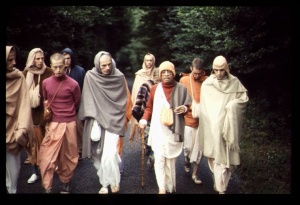CC Madhya 4.123: Difference between revisions
m (1 revision(s)) |
No edit summary |
||
| Line 1: | Line 1: | ||
{{ | [[Category:Sri Caitanya-caritamrta - Madhya-lila Chapter 04|C123]] | ||
<div style="float:left">'''[[Sri Caitanya-caritamrta|Śrī Caitanya-caritāmṛta]] - [[CC Madhya|Madhya-līlā]] - [[CC Madhya 4|Chapter 4: Śrī Mādhavendra Puri's Devotional Service]]'''</div> | |||
<div style="float:right">[[File:Go-previous.png|link=CC Madhya 4.122|Madhya-līlā 4.122]] '''[[CC Madhya 4.122|Madhya-līlā 4.122]] - [[CC Madhya 4.124|Madhya-līlā 4.124]]''' [[File:Go-next.png|link=CC Madhya 4.124|Madhya-līlā 4.124]]</div> | |||
{{CompareVersions|CC|Madhya 4.123|CC 1975|CC 1996}} | |||
{{RandomImage}} | |||
==== TEXT 123 ==== | ==== TEXT 123 ==== | ||
<div | <div class="verse"> | ||
ayācita-vṛtti purī—virakta, udāsa | :ayācita-vṛtti purī—virakta, udāsa | ||
ayācita pāile khā’na, nahe upavāsa | :ayācita pāile khā’na, nahe upavāsa | ||
</div> | </div> | ||
| Line 12: | Line 16: | ||
==== SYNONYMS ==== | ==== SYNONYMS ==== | ||
<div | <div class="synonyms"> | ||
ayācita- | ''ayācita-vṛtti''—accustomed to avoid begging; ''purī''—Mādhavendra Purī; ''virakta''—unattached; ''udāsa''—indifferent; ''ayācita''—without begging; ''pāile''—if getting; ''khā’na''—he eats; ''nahe''—if not; ''upavāsa''—fasting. | ||
</div> | </div> | ||
| Line 19: | Line 23: | ||
==== TRANSLATION ==== | ==== TRANSLATION ==== | ||
<div | <div class="translation"> | ||
Mādhavendra Purī avoided begging. He was completely unattached and indifferent to material things. If, without his begging, someone offered him some food, he would eat; otherwise he would fast. | Mādhavendra Purī avoided begging. He was completely unattached and indifferent to material things. If, without his begging, someone offered him some food, he would eat; otherwise he would fast. | ||
</div> | </div> | ||
| Line 26: | Line 30: | ||
==== PURPORT ==== | ==== PURPORT ==== | ||
<div | <div class="purport"> | ||
This is the paramahaṁsa stage, the highest stage for a sannyāsī. A sannyāsī can beg from door to door just to collect food, but a paramahaṁsa who has taken ayācita-vṛtti, or ājagara-vṛtti, does not ask anyone for food. If someone offers him food voluntarily, he eats. Ayācita-vṛtti means being accustomed to refrain from begging, and ājagara-vṛtti indicates one who is compared to a python, the big snake that makes no effort to acquire food but rather allows food to come automatically within its mouth. In other words, a paramahaṁsa simply engages exclusively in the service of the Lord without caring even for eating or sleeping. It was stated about the six Gosvāmīs: nidrāhāra-vihārakādi-vijitau | This is the ''paramahaṁsa'' stage, the highest stage for a ''sannyāsī''. A ''sannyāsī'' can beg from door to door just to collect food, but a ''paramahaṁsa'' who has taken ''ayācita-vṛtti'', or ''ājagara-vṛtti'', does not ask anyone for food. If someone offers him food voluntarily, he eats. ''Ayācita-vṛtti'' means being accustomed to refrain from begging, and ''ājagara-vṛtti'' indicates one who is compared to a python, the big snake that makes no effort to acquire food but rather allows food to come automatically within its mouth. In other words, a ''paramahaṁsa'' simply engages exclusively in the service of the Lord without caring even for eating or sleeping. It was stated about the six Gosvāmīs: ''nidrāhāra-vihārakādi-vijitau''. In the ''paramahaṁsa'' stage one conquers the desire for sleep, food and sense gratification. One remains a humble, meek mendicant engaged in the service of the Lord day and night. Mādhavendra Purī had attained this ''paramahaṁsa'' stage. | ||
</div> | </div> | ||
__NOTOC__ | |||
<div style="float:right; clear:both;">[[File:Go-previous.png|link=CC Madhya 4.122|Madhya-līlā 4.122]] '''[[CC Madhya 4.122|Madhya-līlā 4.122]] - [[CC Madhya 4.124|Madhya-līlā 4.124]]''' [[File:Go-next.png|link=CC Madhya 4.124|Madhya-līlā 4.124]]</div> | |||
__NOTOC__ | |||
__NOEDITSECTION__ | |||
Revision as of 10:45, 26 July 2021

A.C. Bhaktivedanta Swami Prabhupada
TEXT 123
- ayācita-vṛtti purī—virakta, udāsa
- ayācita pāile khā’na, nahe upavāsa
SYNONYMS
ayācita-vṛtti—accustomed to avoid begging; purī—Mādhavendra Purī; virakta—unattached; udāsa—indifferent; ayācita—without begging; pāile—if getting; khā’na—he eats; nahe—if not; upavāsa—fasting.
TRANSLATION
Mādhavendra Purī avoided begging. He was completely unattached and indifferent to material things. If, without his begging, someone offered him some food, he would eat; otherwise he would fast.
PURPORT
This is the paramahaṁsa stage, the highest stage for a sannyāsī. A sannyāsī can beg from door to door just to collect food, but a paramahaṁsa who has taken ayācita-vṛtti, or ājagara-vṛtti, does not ask anyone for food. If someone offers him food voluntarily, he eats. Ayācita-vṛtti means being accustomed to refrain from begging, and ājagara-vṛtti indicates one who is compared to a python, the big snake that makes no effort to acquire food but rather allows food to come automatically within its mouth. In other words, a paramahaṁsa simply engages exclusively in the service of the Lord without caring even for eating or sleeping. It was stated about the six Gosvāmīs: nidrāhāra-vihārakādi-vijitau. In the paramahaṁsa stage one conquers the desire for sleep, food and sense gratification. One remains a humble, meek mendicant engaged in the service of the Lord day and night. Mādhavendra Purī had attained this paramahaṁsa stage.